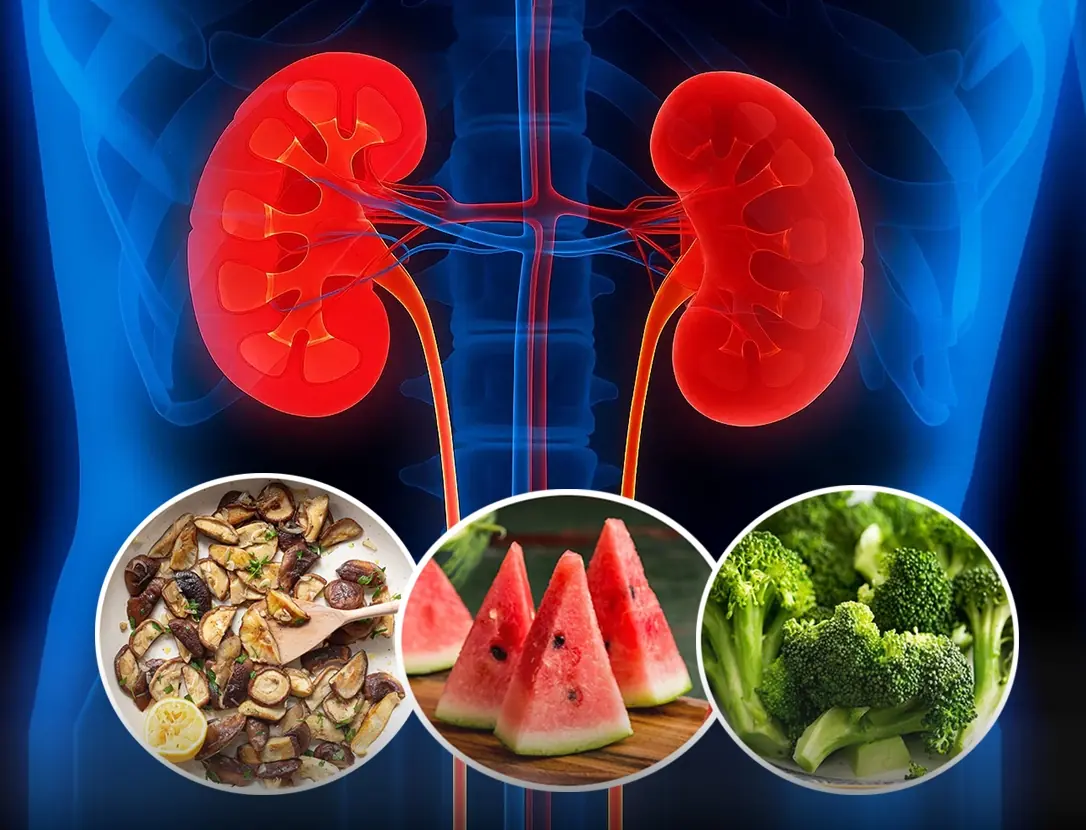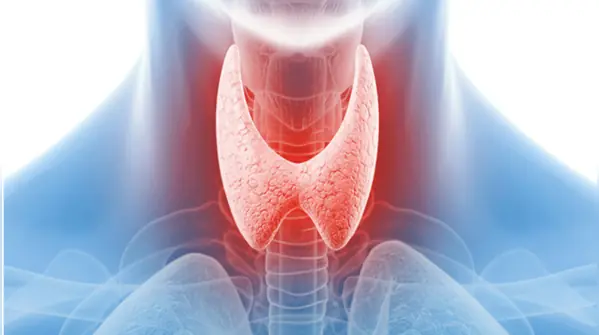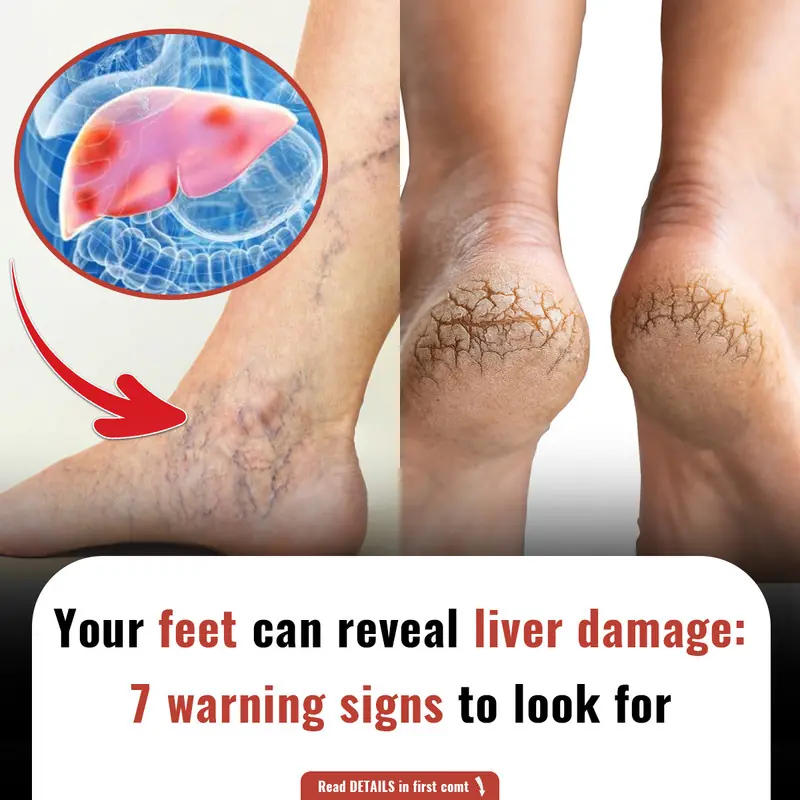
10 foods that are extremely good for the kidn3ys that not everyone knows about
A body with healthy kidneys is a healthy body. These ten foods are incredibly beneficial to the kidneys, but not everyone is aware of them.

5 Common Parts of the Body Where You May Feel Thyroid Pain
The thyroid is a small, butterfly-shaped gland located in the neck that plays a crucial role in regulating metabolism, energy levels, and overall body function. While the thyroid gland is not commonly associated with pain, thyroid dysfunction can cause discomfort in various parts of the body. If you experience any of the following symptoms, it could be a sign that your thyroid is affecting your health.
1. Front of the Neck (Thyroid Area)
The front of the neck, where the thyroid gland is located, is the most obvious area where thyroid issues manifest. Pain or discomfort in this area could indicate thyroid problems like an enlarged thyroid (goiter) or thyroid inflammation (thyroiditis). These conditions can occur in cases of both hypothyroidism (underactive thyroid) and hyperthyroidism (overactive thyroid). If you notice tenderness or swelling in the thyroid region, it's important to get checked by a healthcare provider.
Why it matters:
An enlarged thyroid can lead to pressure on surrounding structures in the neck, causing discomfort. Additionally, thyroid problems can make it harder to swallow or cause a feeling of tightness in the throat.
Recommendations/tips:
If you notice pain, swelling, or a visible lump in the neck area, seek medical attention. Imaging and blood tests such as TSH levels can help determine if thyroid dysfunction is causing the problem.
2. Throat and Voice Box Area
Thyroid dysfunction can also affect the throat and voice box (larynx). An enlarged thyroid can press against the windpipe or esophagus, leading to difficulty swallowing or even hoarseness. These symptoms are particularly common in hyperthyroidism and may be a result of the thyroid being too large, impeding normal throat functions.
Why it matters:
Changes in voice and swallowing issues may be an indicator that the thyroid is impacting your vocal cords and nearby structures. This should not be ignored, as it may point to underlying thyroid issues.
Recommendations/tips:
If you experience hoarseness, difficulty swallowing, or other throat-related issues, consider seeing an ENT (ear, nose, and throat) specialist. A simple laryngoscopy can help evaluate whether thyroid dysfunction is involved.
3. Shoulders and Upper Back
Pain in the shoulders and upper back can also be linked to thyroid issues. In cases of hypothyroidism, the metabolism slows down, leading to muscle stiffness, pain, and discomfort. On the other hand, hyperthyroidism can lead to muscle weakness due to the body’s accelerated metabolic state. These symptoms can contribute to soreness in the upper body.
Why it matters:
The muscle stiffness and pain associated with thyroid imbalances can affect your overall mobility and quality of life. If left untreated, these issues can worsen.
Recommendations/tips:
Incorporating stretching, exercise, and regular physical therapy can alleviate shoulder and back pain caused by thyroid conditions. However, it’s crucial to consult a doctor if the pain is persistent and accompanied by other thyroid-related symptoms.
4. Joints and Muscles Throughout the Body
Thyroid dysfunction can significantly impact the musculoskeletal system, leading to joint pain and muscle discomfort. Individuals with hypothyroidism often experience joint stiffness, muscle cramps, and weakness, which are common symptoms of the condition. Hyperthyroidism can lead to muscle weakness, which can also affect mobility and strength.
Why it matters:
Chronic joint pain and muscle discomfort can be a direct result of thyroid imbalance, and if left untreated, it may interfere with your daily activities.
Recommendations/tips:
Exercise and physical therapy may help relieve muscle and joint pain. If you suspect your thyroid is involved, a thyroid function test can provide important insights into managing these issues.
5. Chest or Rib Cage Area
Though rare, thyroid-related pain can also extend to the chest or rib cage. This might happen when an enlarged thyroid compresses nearby structures, or in severe cases, thyroid cancer can affect surrounding tissues. Additionally, thyroid dysfunction can lead to irregular breathing patterns or difficulty breathing, which may cause chest discomfort.
Why it matters:
Pain in the chest or rib cage should never be ignored, especially if accompanied by other symptoms like difficulty breathing, swallowing, or persistent neck pain. It’s crucial to address these symptoms early to prevent further complications.
Recommendations/tips:
If you experience chest pain along with thyroid-related symptoms, seek immediate medical attention. Your doctor may perform imaging tests to rule out serious issues like thyroid cancer or compression of surrounding organs.
Conclusion: Recognizing and Treating Thyroid Pain
Thyroid-related pain can appear in various areas of the body, and it is important to recognize the symptoms early to prevent further complications. If you experience persistent pain or discomfort in the neck, throat, shoulders, back, or chest, consider consulting a healthcare professional. Early detection and treatment of thyroid dysfunction can significantly improve your quality of life and prevent further complications. A simple blood test to measure TSH, T3, and T4 levels can provide valuable information about your thyroid health and help guide appropriate treatment.
Sources:
Cleveland Clinic – Thyroid Disease Symptoms and Treatments
Mayo Clinic – Thyroid Disease
American Thyroid Association – Thyroid Symptoms and Causes

A body with healthy kidneys is a healthy body. These ten foods are incredibly beneficial to the kidneys, but not everyone is aware of them.

Certain fruits and vegetables successfully reduce liver enzymes, cool the liver, and have anti-inflammatory properties. Individuals who have elevated liver enzymes should take supplements on a daily basis.

Measles cases in the US have reached a 25-year high. Learn about symptoms, risk zones, and how to prevent measles with vaccination and health tips.

Learn about allulose, the new sugar alternative that doesn’t spike blood sugar or insulin levels. Find out how it can help reduce body fat and why it’s a better choice compared to other sugar substitutes.

Discover 6 simple habits that can help prevent fatty liver and improve liver health. Learn about the importance of a balanced diet, regular exercise, hydration, and more to protect your liver from fat buildup.

Learn about the common risk factors, symptoms, and early detection of head and neck canc3r. Discover ways to prevent this dise@se and protect your health with expert advice.

7 signs of liver damage seen in the feet

Some familiar devices in the household are actually silent yet formidable "power eaters."

Persistent foamy urine may indicate health problems, while occasional bubbles are typically harmless and can be addressed with proper hydration. Dr. Shirley Koeh recommends that if the bubbles continue even after drinking more water and urinating frequent

What are recurring UTIs: 5 simple ways to keep them at bay

The biggest difference between humans and animals, besides the ability to think independently, is the capacity to manage their emotions well. That is why people in the past often said, "A person who laughs looks ten years younger."

The reason is that aside from wasting money, the 5 types of shrimp below can also cause many diseases when consumed.

You should not buy tofu haphazardly, as there are certain types that should absolutely be avoided, especially the following 4 types.

Most people use a lot of dishwashing liquid to clean grease from dishes. However, insufficient rinsing can lead to ingesting residual detergent, so it is very important to pay attention.

Stuck in pur-gut-ory?

Kelly Barta was turning red.

Could advanced goggles help in identifying hidden swimmers?

Discover the surprising secret to longevity. WWII veteran Leslie Lemon credits eating custard every day for his vibrant health at 106. Learn about his daily habit and how it contributes to his well-being.

Discover how Danielle Broadway lost 90 pounds and improved her gut health by quitting energy drinks and embracing intermittent fasting with the help of the Simple app. Learn the science behind intermittent fasting and the benefits of a healthier lifestyle

The DHT Blocker Pack and Hair Loss Reversing Pack provide natural, effective remedies that target the root causes of hair loss, stimulate growth, and nourish the scalp.

Discover the incredible journey of Evelyn Ashford, the Olympic sprinter who defied expectations, won four gold medals, and became a symbol of quiet determination and resilience.

A mother learns the quiet strength of her smile through her daughter’s words at a basketball game. Discover how encouragement—even in small gestures—can uplift a child’s confidence.

Discover how a new neighbor's simple acts of kindness transformed the life of Mrs. Sandra, a reclusive artist. This heartwarming story illustrates the power of community, rekindled passions, and finding connection in unexpected places.

Learn how listening deeply and observing fully can enrich your life. Discover the power of being present and the profound impact it has on relationships, empathy, and experiences.

Witness a heartwarming story of modern family redefined: a father, divorced 28 years, still mows his ex-wife's lawn. This powerful example of co-parenting, respect, and unconditional kindness teaches invaluable lessons about love and family.

Discover the incredible true story of Master Sgt. Henry Erwin, who saved his B-29 crew in WWII by risking his life to dispose of a burning phosphorus b0mb mid-flight.

Dive into the peculiar history of the Great Depression's "Honey Bandits." Discover the 1933 unsolved heist in Brooklyn, where thieves siphoned liquid gold, leaving behind a sticky, intriguing tale of desperation and cleverness.

These DIY treatments not only provide nourishment but also help improve scalp health, stimulate hair growth, and strengthen hair roots.

Discover Nona Gaprindashvili, the pioneering chess champion who broke barriers in the 1960s and became the first woman to earn the title of International Grandmaster, leaving a legacy that inspired generations.

Explore the life of Hari Rhodes, an actor from the 1960s TV series Daktari, who used his platform to fight for racial equality and made a lasting impact on American pop culture and the civil rights movement.

A powerful and shocking moment unfolded when I confronted my brother's fiancée after she insulted me at my own upscale restaurant. But what followed was a lesson in humility and redemption.

My daughter suddenly started locking her bedroom door and pulling away from me. One night, I quietly kept the door from closing and waited. When I finally stepped inside, I found her laughing with a boy.

“No, I’m going to Thailand, not to your mom’s garden beds,” I refused to go to the dacha, and my husband got offended.

A mysterious baby born with an unusual heartbeat starts to change the lives of everyone around him. From medical staff to nurses, his presence brings hope, awe, and a chilling sense of wonder.

By incorporating these simple yet effective DIY treatments into your skincare routine, you can visibly improve your skin’s appearance in as little as 10 days.

After her roommate abandoned her cat, a woman took responsibility for the pet's care, but when the roommate returns months later, she threatens legal action. Did she make the right decision?

A son and daughter grapple with their stepfather’s forgetfulness on their mother’s birthday, leading to an emotional realization and a heartwarming reconciliation.

A mother shares her past experience with her daughter who is struggling with body image, only to have her daughter react angrily. What happens when the mother tries to comfort her and help her embrace her own body?

A family secret about my brother’s child outside of his marriage was uncovered by my husband’s background check. Now, I’m facing a family dilemma about revealing the truth to our parents and handling the consequences.